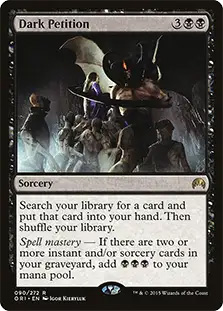In this article, I'm going to discuss the discard spells in The Epic Storm, and the different ways to use them in order to have the highest impact. This article was initially supposed to be much longer and much more complex, but the banning of Gitaxian Probe meant the removal of Cabal Therapy from most deck lists. Cabal Therapy was a card with an immense amount of strategic depth to discuss, and while some people are still playing with the card, I don't think it is worth inundating new players with information that won't have much relevance to them. Should Cabal Therapy ever makes it way back into the deck en masse, I'll consider putting out a piece then, but for now, we are going to focus on the cards that are actually commonly played.
This article should be relatively straightforward, as the two spells we'll be discussing today are Duress and Thoughtseize, which largely overlap in how you should be using them, with only a few differences. The overall concepts that we'll be looking at are when to play them versus when you wait on playing them, and what to take with them. The only real difference to keep in mind is that Thoughtseize can take creatures such as Thalia, Guardian of Thraben, while Duress can't. This is why the sideboard guide recommends taking out Duress against decks like Death & Taxes.
As a general rule, ignoring all else, you want to hold your discard spells until your combo turn against decks with counter spells, but if your opponent is playing a combo deck or a deck whose angle of attack is largely permanent-based (think Chalice of the Void or Thalia, Guardian of Thraben), then you'll want to play your discard spells as soon as possible. Let's explore these concepts a bit more to understand why, and to understand when to deviate from these rules!
Against blue decks with counter spells, waiting as long as possible to play your discard spells increases your chances of actually hitting their counter spell, and gives you the most amount of knowledge for when you combo. If you play Duress on turn one and then try to combo on turn three, your opponent has had two draw steps that you don't know about, not including any Brainstorms or Ponders that they may have played in the meantime. Further, casting a discard spell prior to your combo turn allows your opponent to use Brainstorm in order to hide the counter spell on top of their deck, redrawing it on the next turn to punish you. If you had waited until your combo turn in order to cast the discard spell, you would know for sure whether or not the coast is clear, and insulate yourself against any weird Brainstorm tricks. It's important to be aware though that if your opponent put a card back on top of their library with Brainstorm and then you see their hand and it contains another Brainstorm, they then have immediate access to the top card should you combo off that turn, unless you take the Brainstorm with your discard spell.
The other major reason to wait on casting your discard spells is to play around cards like Daze, Flusterstorm, and Spell Pierce. Against decks with both Daze and Force of Will, it can feel miserable to have your only discard spell caught by Daze in a hand that could have otherwise beaten a Daze, only to lose to the Force of Will that you can't get out of their hand. Further, you allow your discard spells to get maximum contextual value, as your opponent will have likely used the majority of their draw spells such as Brainstorm, Ponder, and Preordain, meaning that you'll be looking at their hand with the most complete information, rather than having cards change immediately after you pass the turn.
In reality, mana can sometimes be an issue, and we often don't have the luxury of extra mana to cast our discard spells on our combo turn. In situations where you think mana might be an issue, it is okay to use your discard spell a turn early in order to free up the mana for the following turn. Against blue decks that don't have too many draw spells, this can be especially potent as you force them to find the answer in exactly one draw step. Be wary about doing this against decks with extra draw spells like Miracles though, as four Brainstorm, four Ponder, and four Portent in addition to a slew of other draw spells means that they have a high chance of finding another counter spell on their next turn.
Something else to keep in mind is the number of discard spells that you expect to have access to. If you have two discard spells already in your hand, it can be okay to use one aggressively and save the other for later in the game. The reason for this is that if they have no counter spells in hand, you can remove a draw spell to limit their ability to find one, and the second discard spell should clean up the one they might find in the next few turns. If they have one or more counter spells in hand, you get to take one and end up in the same situation as if you had waited to play both of your discard spells but with one additional mana available on later turns.
Additionally, if you have a hand with many copies of Brainstorm and Ponder and you expect to play a much longer game against a slower deck like Miracles, using one discard spell aggressively can give you information as to how you want to be sculpting your hand over the next few turns. On top of that, you are likely to be able to find more discard spells over the next few turns with your draw spells anyway, so the loss of the discard spell early on shouldn't end up hurting you. Further, many blue decks like to blend a mix of counter spells and permanent-based hate such as Counterbalance or Meddling Mage, so using a discard spell more aggressively can insulate against that. This becomes much more useful after sideboarding where these permanent-based hate cards become more common.
If your opponent is playing a combo deck that also plays counter spells, such as Sneak & Show, the decision to play your discard spells aggressively can often depend on the context of your hand. If you have a slower hand, you'll want to use your discard aggressively to prevent them from assembling their combo before you can. If you have a very fast hand that will have access to extra mana on the combo turn, it can be okay to wait the extra turn in order to make sure your combo resolves. Through practice, you'll start to learn the average combo turn of many of the combo decks in the format, and this well help inform your decision as to how long you can wait before using your discard spells.
If your opponent is playing a deck that plays both counter spells and discard spells such as Thoughtseize or Hymn to Tourach, try to determine how resilient your hand is to discard. If you have cards like Brainstorm, you can often afford to let them cast discard spells. Further, if you have extra copies of your important spells such as Infernal Tutor, consider putting your important permanents like Lion's Eye Diamond into play, which will greatly reduce the impact of their discard spells. If you feel that your hand is very sensitive to discard spells, feel free to use yours a bit more aggressive in order to remove any discard spells from their hand.
Against combo decks without counter spells like The Epic Storm, and against decks with permanent-based hate such as Chalice of the Void and Thalia, Guardian of Thraben, you pretty much always want to use your discard spells as aggressively as possible. You want to stop combo decks from winning the game before you do or using their discard spells to shred your hand apart, and you want to stop the prison decks such as Death & Taxes or Steel Stompy from locking you out of the game. Waiting on your discard spells won't do you very much good most of the time, as they are going to immediately play any of the good cards they draw if possible, so they won't get too much better.
The only two remotely common exceptions to this rule that I've run into are against Death & Taxes and Lands. Against Death & Taxes, if you have a fast Empty the Warrens hand that will win before they can play one of their important creatures, there can be some value in waiting assuming your combo turn won't require you to discard your hand to Lion's Eye Diamond. The reason for this is that Batterskull will often be the only card that beats you at that point, in which case you want to make sure you can beat a hand of two Stoneforge Mystics. If you cast it early and take one, they get to play the other and beat you with Batterskull. If you instead wait until they play the Stoneforge Mystic, you can take the Batterskull on the next turn and proceed to win the game.
The same general rule can apply to any deck that plays answers to Empty the Warrens, such as Steel Stompy with Ratchet Bomb, but it is much less likely there because unlike Death & Taxes, those decks can play hate pieces as early as the first turn, in which case you won't be able to win before they can play something assuming you aren't winning on the first turn. Also remember that many of these decks are capable of sideboarding in Mindbreak Trap, and Death & Taxes brings in Chalice of the Void sometimes, which may cause you to reconsider your decision to wait even with your fast Empty the Warrens hands.
The Lands exception is for hands that will heavily require use of the graveyard, such as hands that can only realistically win by using Burning Wish to find either Past in Flames or Dark Petition. In this case, waiting can be valuable in order to remove Crop Rotation from their hand on the combo turn to avoid losing to Bojuka Bog. That said, this comes up very rarely, as most of the time you are better off using your discard spell aggressively to ensure they don't have a Chalice of the Void or Sphere of Resistance, and taking Crop Rotation if they don't have one of the artifacts. Sure, you might lose to a top-decked Crop Rotation, but you are more likely to lose to a hate artifact that you didn't take. This line only really becomes an option if you have a hand with Chain of Vapor or Echoing Truth that can afford to let the opponent play one of the prison artifacts.
In the dark when I don't know what my opponent is playing, I will use my discard spells more aggressively if I don't have anything else meaningful to do with my mana. This helps insulate against the possibility of a combo deck, Thoughtseize deck, or Chalice of the Void deck, while still not being the worst against blue decks because you can take their counter spell or their draw spell, depending on the nature of their hand.
Moving on to what to take, this decision is often very straightforward against non-blue decks. Against decks with permanent-based hate, you take the best hate card if they have one. The best hate card can either be the one they play the quickest if you have a quick hand, or the one that you feel is the hardest to overcome if you have a slow hand. If they do not have any hate cards in their hand, take the card that either allows them to find a hate card or, barring that, the card that threatens to kill you the quickest.
Against combo decks without counter spells, you generally want to take the card that most prevents them from winning the game. This can mean taking a tutor effect or a spell that generates a lot of mana (think Lion's Eye Diamond or Natural Order). If their hand is a bit slower and you think yours is fast but potentially weak to a discard spell, look to take their discard spell. If both your hand and their hand are a bit on the weaker or slower side, try taking their draw spells to prevent them from assembling their combo or finding a discard spell to disrupt yours.
Against combo decks with counter spells, it is very contextual but largely relies on the speed of your hand and theirs. This follows the same rules as taking combo pieces versus discard spells against combo decks without counter spells that I discussed in the previous paragraph.
Finally, against midrange or control decks with counter spells, you'll be looking to take a counter spell almost every time. If they don't have a counter spell, you want to take the draw spells that will allow them to find one. If they have multiple counter spells, lean towards taking the one your hand will have the hardest time beating. This will often be Force of Will or Flusterstorm, as Daze and Spell Pierce are cards that can easily be overcome with a little bit of extra mana. Always keep in mind that in a hand of just Force of Will and one other blue card, you'll want to take the other blue card if you are winning this turn and they have less than five mana, as they will be unable to cast Force of Will. This is especially useful if that blue card is Brainstorm or another counter spell.
The last bit of information I want to extend is what to do if the opponent played a Brainstorm in response to your discard spell. Realistically, not much changes about what to do. You'll want to play your future turns with the knowledge that they may have hidden a counter spell in mind, but your rules for what to take largely stay the same. You'll still want to take their highest impact card and if they have nothing important, it doesn't really matter what you take. If they are playing a combo deck, consider the most likely set of things they would've hidden. If they are happy showing you a hand that has a discard spell and a full combo ready to go, chances are good that they hid a redundant combo piece and don't mind having their Infernal Tutor taken by a Duress. Make sure you are accounting for things like this, and spend more time considering taking more generic pieces of the combo like Dark Ritual that they may more easily recover from, but at the cost of being a turn or two slower to actually win.

























